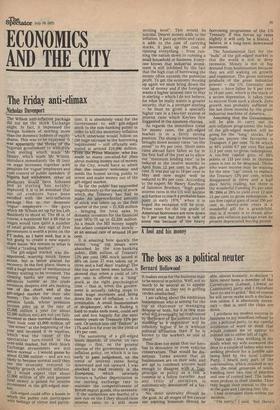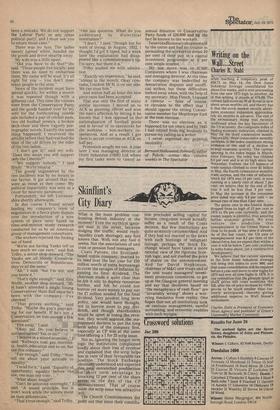A fool and his money
The boss as a political neuter
Bernard llollowood
It makes sense for the business man to be neutral in politics. Well, not so much to be neutral as to appear neutral and, as they say in golfing circles unattached.
I am talking about the ambitious businessman who is aiming for the top as chairman or managing director or both, for it is this man who will eventually be confronted by the power of the unions; and his standing as a negotiator will be infinitely higher if he is without political affiliation than if he is known to the workers as one of 'them'.
This does not mean that our hero has to denounce or even criticise conservatism. That would be disastrous. Tories assume that all businessmen are on their side, and are apt to condemn anyone bold enough to disagree with a ,Taw principle or policy as a red, a commie or a fellow traveller. And any critic of socialism is automatically denounced as a fascist pig.
No, strict neutrality should be the goal. At all stages of his career our aspiring bossman should be able, almost honestly, to declare "I have never been a member of the Conservative (Labour, Liberal or Communist) party and I therefore have no axe to grind." But of course (he will never make such a declaration unless it is absolutely necessary — that is, until the chips are down.
I attribute my modest success in , business to my steadfast refusal to join a political party, to my careful avoidance of word or deed that wOuld commit me or appear to Commit me to either left of right.
Years ago I was working in my study when my wife answered the door to a couple of ladies who were seeking produce for a jumble sale 'being held by the local Labour Party. I heard only part of the conversation, which resulted in my wife, the most generous of souls, handing over two tins of peaches and one of corned beef. The ladies were profuse in their thanks. Then they began their retreat to the car at the gate and I sprang into life.
had overtaken them within ten seconds.
-I'm sorry," I said, -hut there's
been a mistake. We do not support the Labour Party or any other political party', and I must ask you to return those cans."
There was no fuss. The ladies merely turned white, handed me the goods and drove smartly away.
My wife was a little upset.
"Did you have to do that?"she said. "Those people live locally, and there was no need to embarrass them. My name will be mud. It's all right for you you don't meet many people in the area."
News of the incident must have spread quickly, for within a month it was repeated though with a different cast. This time the visitors were from the Conservative Party, and the goods handed over by my wife for the forthcoming jumble. sale included a pair of cricket pads, two old football jerseys, a broken deck-chair and three vaguely pornographic novels. Exactly the same thing happened: I recovered the articles before they had reached the boot of the car driven by the elder of the two ladies.
don't get it!" said my wife. "Does this mean you will support only the Liberals?"
• -We support nobody," I said firmly. "We're neutral." .
• The gossip engendered by the two incidents was by no means in our favour. It got around that we were as mean as they come. My political impartiality was seen as a cover for neurotic parsimony.
Fortunately, we left Leicestershire shortly afterwards.
In due course I found myself. leading my company's team of negotiators in a fierce plant dispute over the introduction of a new system of piece rates based on time-and-motion study research conducted for us by an American group of management consultants.
• The workers rejected the finding out of hand.
"We're not having Yanks tell us how much we can earn," said Bob Trilby, a senior shop steward. "The Yanks are all bloody Conservatives. Democrats or Republicans, they're all the same."
"Ah," I said, "but I'm nbt, and you know it."
• "That's right enough," said Alex Wolfit, another shop steward. "Mr H hasn't attended a single Young Conservatives' Hunt Ball since he's been with the company. I've checked."
"That proves nothing," said Trilby. "Maybe the guy's play-acting for our benefit. If he's not a Conservative, let him answer a few questions!"
"Fire away," I said. "Okay, pal. Do you believe in nationalisation? Yes or no?" r "I believe in a mixed economy," I said. "Railways, coal, gas, electricity, health, education and so on, but not this company."
"Fair enough," said Trilby. "Now .tell me about your attitude to equality."
"I'm all for it," I said. "Equality of opportunity; equality • before the law, one man one vote ..."
"What about dough?"
"Can't be achieved overnight," I i
said. "A sound principle, but t won't work while the unions insist on their differentials."
"That'slrue enough,".said Trilby._ "One last question. What do you understand by dialectical
materialism?" • "I don't," I said, "though not for want of trying. In August, 1932, I
thought I'd got it taped, but a week later the explanation had disappeared like a commissionaire's tip I'm sorry, but there it is."
Trilby studied me with admiration.
"Exactly my experience," he said, "almost to the month. Okay comrades, I reckon Mr H. is on our side. We can trust him."
And within half an hour the new piece rates had been accepted.
That was only the first of many similar successes. •I moved on to ACK as planning officer and won the men's affection, by letting it be known that I was opposed to thel• nationalisation of football pools' and in favour of co-operatives for the workless non-workers' co operatives. And as a result I got them to accept overtime at ACK on half pay. PromotiOn sought me out. A year later I was managing director of Overt Industries (1926) Ltd where my first tasks were to cancel an annual donation to Conservative Party funds of £20,000 and let the fact be known to the workers.
lwaSveitedlionoraryshop steward by the union and had no trouble in persuading the workers to invest 20 per cent of their pay in a capital investment programme at 2 per cent simple interest.
My last move was to ICMP Computers where I was chairman and managing director. At the time the company was bedevilled by demarcation disputes and unofficial strikes, but these difficulties melted away when, with the help of my secretary, Miss Flesch, I caused a rumour — false or course, to circulate to the effect that I should oppose the sitting Conservative member for Megthorpe East at the next election.
There was no election as it happened for ten years, and by 1945 I had retired from big business to pursue my calling as a writer.
I never regretted my political neutrality.
Bernard Hollowood, formerly editor of Pithch, writes this column weekly in The Spectator



































 Previous page
Previous page